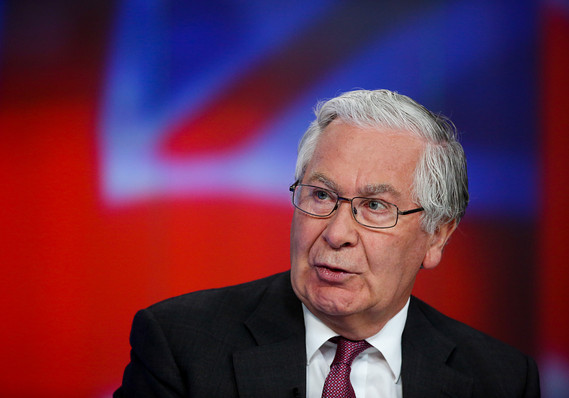 Bloomberg
Bloomberg A sense of gloom about the global economy permeated the International Monetary Fund and World Bank annual meetings over the past week in Washington.
The international organizations officially slashed their global growth forecasts and warned of dire consequences if the standoff between the U.S. and China over the future of the global trading system is not ended. There was no sign that either side was listening.
If there was a prize for the gloomiest speaker at the gathering, it might have gone to former Bank of England governor Mervyn King, who used his experience as a policy maker to try to shake current officials into action.
In his Per Jacobsson Lecture, a closely watch speech that caps the week of closed-door meetings, briefings and news conferences, King said that economists and policy makers seem scared to challenge old ideas and were “sleepwalking” toward the next economic and financial crisis.
‘Another economic and financial crisis would be devastating to the legitimacy of a democratic market system. By sticking to the new orthodoxy of monetary policy and pretending that we have made the banking system safe we are sleeping toward that crisis.’
There are two major policy areas where there is an intellectual and political unwillingness to challenge conventional wisdom, King said.
The first is that policy makers remain resistant to the idea that the global economy has entered a period of “secular stagnation.”
The term, used first by former Treasury Secretary Larry Summers to describe a conditions where there is too much savings in the world and a lack of investment. This brings down inflation and interest rates.
“It is surprising that there has been so much resistance to the hypothesis that, not just the United States, but the world as a whole is suffering from demand-led secular stagnation,” King said.
“It surely now time to admit that we are experiencing it,” he added.
One important policy consequence if this theory is correct is that central bank tweaking interest rates is not going to restart the global economy, King noted.
Instead, much deeper economy reform is required, he said.
“To escape permanently from a low growth trap involves a reallocation of resources from one component of demand to another, from one sector to another, and from one firm to another,” King said.
“The answer goes well beyond monetary and fiscal policies to include exchange rates, supply-side reforms and measures to correct unsustainable national saving rates,” he added.
Without action to deal with the structural weaknesses of the global economy, there is a risk of another financial crisis, emanating this time not from the U.S. banking system but from weak financial systems elsewhere, he said.
This is the second area of intellectual timidity.
Governments have not forced banks to accept any limits on their activities that would satisfy public concern that banks were still taking all the profits from risky lending and letting the public bear the cost of any missteps.
King said he thought banks should pay a tax for maturity transformation, and those funds would be used to build up a crisis lending fund, King said.
“The political economy of ‘bailing out’ banks would be much improved if we could show that banks had subscribed in good times to an insurance scheme which entitled them to borrow in bad times,” he said.










Add Comment